By Marathana Prothro
 In a meeting Sunday and Monday with the executive directors and board chairs of Mennonite Education Agency, Mennonite Mission Network, MMA and Mennonite Publishing Network (Mennonite Church USA’s churchwide agencies), the moderator and moderator-elect of Mennonite Church USA shared the Executive Board’s vision for a reformed and unified churchwide organization.
In a meeting Sunday and Monday with the executive directors and board chairs of Mennonite Education Agency, Mennonite Mission Network, MMA and Mennonite Publishing Network (Mennonite Church USA’s churchwide agencies), the moderator and moderator-elect of Mennonite Church USA shared the Executive Board’s vision for a reformed and unified churchwide organization.
Moderator Sharon Waltner of Parker, S.D., and moderator-elect Ed Diller of Cincinnati, Ohio, expressed the board’s concerns to the group, which also included Mennonite Church USA executive director Jim Schrag and associate executive director Ron Byler. At its Feb. 8 to 9 meeting in San Antonio, Texas, the Executive Board stated that the denomination’s vision and call “is not adequately supported by our present relationships, behaviors and organization.”
To support the vision of Mennonite Church USA, the Executive Board is calling for a unified churchwide communication and identity system and a simple and cohesive funding system. The Executive Board is also suggesting that an additional person be added to the Executive Leadership staff with the goal of assisting the executive director to ensure churchwide ministries practice good stewardship by reducing duplication and increasing organizational effectiveness at meeting congregational needs.
Finally, the Executive Board believes that the unity of purpose needed to adequately support the vision requires the development of one, integrated board of directors for the denomination that would replace the individual boards for each agency.
“Too often, we appear scattered organizationally and motivated by narrow purposes and segmented missions that do not equip our members and congregations for ministry,” Waltner said. “Our future depends on our ability to grasp new relationships and behaviors that support community, equip our members and offer a clear, focused, unified identity and witness for Christ in the world.”
Waltner said the Executive Board came to these conclusions in two closed sessions without staff present at its San Antonio meeting. The board agreed it was important to share and discuss this direction first with agency executives and board chairs before public discussion. Area conference and constituency group leaders will be invited into the conversation later this month when the Constituency Leaders Council (CLC) meets March 31 to April 2 in Mt. Pleasant, Pa.
The Executive Board agreed at its September 2007 meeting in Newton, Kan., to lift up Vision: Healing & Hope and its missional church priorities as a framework for future board direction. The board said it would lead the church in responding to the Church Member Profile findings and would evaluate churchwide systems by how effectively they supported congregations.
Also at its September meeting, the Executive Board agreed it would accept its leadership position and authority in Mennonite Church USA. Waltner and Diller said this guiding principle was stirred by delegate responses at San José 2007 calling for the Executive Board to take a more prominent role in vision and leadership for the whole of the denomination.
Waltner and Diller said the denomination’s six year review, delegate table group responses from San José 2007, feedback from the Constituency Leaders Council, a 2006 CLC task force report, a 2005 funding study and the Church Member Profile 2006 all indicate a need for improving the ability of churchwide ministries to function effectively, to relate to each other and to support area conferences and congregations as they seek to join God’s work in the world.
“An increasing number of congregations and area conferences are calling for integrated churchwide communications and funding practices that bring clarity to their connection to other parts of Mennonite Church USA and support the whole denomination as a unit,” Diller said.
Waltner said that while the Executive Board has stated its desired outcomes, it wants to engage the other parts of the church in developing a plan for how to achieve them. She said the board wants the best thinking from across the church on how best to reorganize the denomination and its agencies in a way that best meets congregational needs.
One churchwide communication and identity system
The Executive Board sees redundancy—such as multiple news services, uncoordinated congregational mailings and competing organizational identities—in the area of communication as a hindrance to the denomination’s combined capacity to enable Mennonite Church USA congregations and members to strengthen their witness. At present, each of the agencies and Executive Leadership coordinates some joint communication, though the majority of each staff’s work is separate from the work of other staff. To remedy the duplication, the Executive Board calls for one churchwide communication and identity system that is headed by and in the denominational center.
Area conferences will be needed to help shape and participate in a new churchwide communication system. The board wants the system to include The Mennonite magazine so that all communication from church entities to congregations and their members will be integrated.
A simple and unified funding system
Currently, Mennonite Church USA has multiple funding systems that are complicated and lead to what appears to be competition among agencies, colleges, area conferences and related groups for funds. As the system currently operates, each agency is responsible for raising its own funds independent of the others. Executive Leadership does not actively raise funds from individuals, but relies on contributions from area conferences and agencies to support its ministries.
A funding study of Mennonite Church USA household giving completed in 2005 by Advancement Associates indicated that Mennonite Church USA is a small denomination with too many organizations competing with each other for the same funds. For board members, this raises a concern about whether existing church structures are sustainable—or relevant—for the future of the denomination.
The board calls for a simple and unified funding system that respects designations from donors while providing funding where it’s most needed in the denomination. The funding system, like the communication system, will be headed by and in the denominational center.
One integrated board of directors
At present, each agency and The Mennonite has its own board of directors that are responsible to the Executive Board. The Executive Board acts on behalf of the Delegate Assembly, the denomination’s decision-making body, when it is not in session.
The Executive Board is calling for an integrated board of directors for the agencies, Executive Leadership and The Mennonite that would make space for meaningful, connective voices from present agencies and conferences. The shape of a new integrated board will be the subject of discussion between now and the all-boards meeting June 19 to 21 in Columbus, Ohio, Waltner said.
Next steps
After the CLC joins the conversation at its March 30 to April 2 meeting in Mt. Pleasant, Pa., the Executive Board’s Executive Committee will meet to evaluate the discussions with agencies and conferences. The committee also will prepare for discussion with other churchwide boards June 19 to 21. Boards participating in that meeting include the Executive Board, Mennonite Education Agency, Mennonite Mission Network, MMA, Mennonite Publishing Network and The Mennonite. This meeting was set more than a year ago and will be the first gathering of all Mennonite Church USA boards of directors since its inception in 2001. Immediately following the all-boards meeting in Columbus, the Executive Board will have time to evaluate next steps. Those steps will be reported as they are discerned.
Diller shared his optimism about the future, “The strength of our vision, supported by clearer identity and stronger behaviors of community might surprise us in its capacity to invite increased support for all parts of our mission.”
SIDEBAR: A summary of delegate responses from the San José 2007 Minutes book
The Executive Board at the San José 2007 Delegate Assembly asked delegates, “In what ways do you recommend that Mennonite Church USA organizational structures be modified as the church moves into its next phase of growth?” This is a brief summary of the table group responses listed in the San José 2007 Minutes Book.
- Many delegates felt uninformed of the current organizational structure. They asked for specifics about what may or may not be working. One group wrote, “The structure is known but its usefulness and function is less well understood.”
- Delegates expressed a desire for Mennonite Church USA organizational structures to be driven by churchwide priorities.
- Delegates called for more streamlining or consolidation of activities among agencies, the Executive Board and Executive Leadership.
- Delegates highlighted duplication of ministry as a concern. One specific comment was “Executive Leadership and MMN both involved in peace initiative and missional church education—who is leading?”
- Delegates called for a more efficient funding system. “It would be wonderful to give to one rather than so many parts!,” one group wrote. Another responded, “(We) need a clear and easy way to distribute money to the groups in the church.”
- Delegates requested a proposal of how the Executive Board would change the structures, and some responded that “If it’s not broken, don’t fix it!”
Source: San José 2007 Minutes Book, pages 42 to 43.

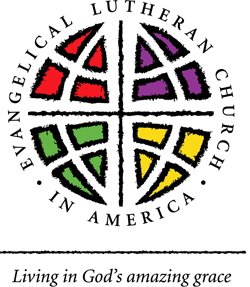
 Members of
Members of 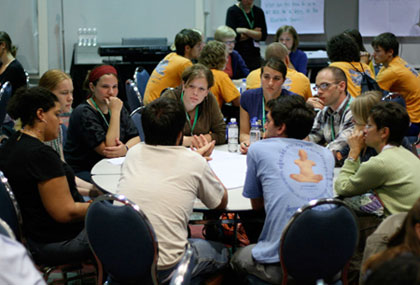 The People’s Summit was announced in July 2007 at the Mennonite Church USA biennial convention in San Jose, Calif., and the MC Canada annual delegate assembly in Abbotsford, B.C. The two denominations last met together at a joint convention in Charlotte, N.C., in 2005 where delegates strongly supported continuing to meet together.
The People’s Summit was announced in July 2007 at the Mennonite Church USA biennial convention in San Jose, Calif., and the MC Canada annual delegate assembly in Abbotsford, B.C. The two denominations last met together at a joint convention in Charlotte, N.C., in 2005 where delegates strongly supported continuing to meet together. After decades of partnership, both formal and informal, Andover (Vt.) Community Church and Franconia Mennonite Conference have disengaged. Most recently, the Andover congregation had been considered a Partner in Mission through the credentialing of the congregation’s pastors, Dan and Christine Chapman. After the termination of the Chapman’s leadership of the congregation and upon further consultation, the relationship effectively ended in November of 2007.
After decades of partnership, both formal and informal, Andover (Vt.) Community Church and Franconia Mennonite Conference have disengaged. Most recently, the Andover congregation had been considered a Partner in Mission through the credentialing of the congregation’s pastors, Dan and Christine Chapman. After the termination of the Chapman’s leadership of the congregation and upon further consultation, the relationship effectively ended in November of 2007. The Constituency Leaders Council (CLC) of
The Constituency Leaders Council (CLC) of  Participants at the meeting worshiped together and also discussed a number of issues. One area of concern was the gender and racial-ethnic composition of the group; Mennonite Church USA has called the church to recognize the gifts of all people within the church but women accounted for only 20 percent of the attendees at this meeting. The highest percentage of women attending a Constituency Leaders Council gathering was 38 percent in 2005, and most church-related agencies and organizations seek an equal ratio of men and women.
Participants at the meeting worshiped together and also discussed a number of issues. One area of concern was the gender and racial-ethnic composition of the group; Mennonite Church USA has called the church to recognize the gifts of all people within the church but women accounted for only 20 percent of the attendees at this meeting. The highest percentage of women attending a Constituency Leaders Council gathering was 38 percent in 2005, and most church-related agencies and organizations seek an equal ratio of men and women. When lunch was served to the delegates of the oldest Mennonite conference in the Western Hemisphere, the buffet table held Vietnamese egg rolls, fried tofu, peanut sauce, candied yams and fried chicken. Interpreters translated business agenda and updates into three languages. At the
When lunch was served to the delegates of the oldest Mennonite conference in the Western Hemisphere, the buffet table held Vietnamese egg rolls, fried tofu, peanut sauce, candied yams and fried chicken. Interpreters translated business agenda and updates into three languages. At the 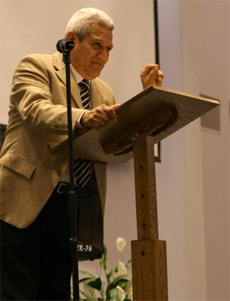 The gathering opened on Friday evening with worship. Gilberto Flores, who is a denominational minister with
The gathering opened on Friday evening with worship. Gilberto Flores, who is a denominational minister with  “I see hope, as a new leader, in Franconia Conference, in our church, in the way God is working,” says Castillo. “God is the hope for me, because the things I expect will happen don’t always happen, but all these unexpected things I didn’t know God was already working on beginning to happen. There’s so much hope in the fact that God is bringing more and more people in the Conference that are not like us. In the Bible it talks a lot about ‘the others,’ the unexpected people that God used in miraculous and wonderful ways . . . Sometimes it is ‘the others’ that God needs in this place and in this time.”
“I see hope, as a new leader, in Franconia Conference, in our church, in the way God is working,” says Castillo. “God is the hope for me, because the things I expect will happen don’t always happen, but all these unexpected things I didn’t know God was already working on beginning to happen. There’s so much hope in the fact that God is bringing more and more people in the Conference that are not like us. In the Bible it talks a lot about ‘the others,’ the unexpected people that God used in miraculous and wonderful ways . . . Sometimes it is ‘the others’ that God needs in this place and in this time.”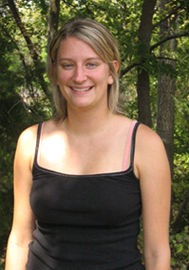 Kara Miller of Perkasie, Pa. and Samuel Moyer of Plymouth, Vt. both began one year terms with Mennonite Voluntary Service (MVS).
Kara Miller of Perkasie, Pa. and Samuel Moyer of Plymouth, Vt. both began one year terms with Mennonite Voluntary Service (MVS). Gregory Bishop, of Blooming Glen, Pa., began a Service Adventure assignment August 2007 in Raleigh, N.C. A 2007 graduate of
Gregory Bishop, of Blooming Glen, Pa., began a Service Adventure assignment August 2007 in Raleigh, N.C. A 2007 graduate of 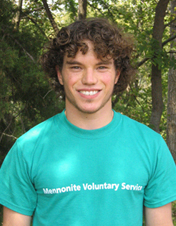 Service Adventure brings together young adults ages 17-20 to live in a household community with a leader for 10 months. Since 1989 Service Adventure participants have served in medical clinics, tutored children, worked with senior citizens, repaired old housing and helped meet needs across North America.
Service Adventure brings together young adults ages 17-20 to live in a household community with a leader for 10 months. Since 1989 Service Adventure participants have served in medical clinics, tutored children, worked with senior citizens, repaired old housing and helped meet needs across North America.